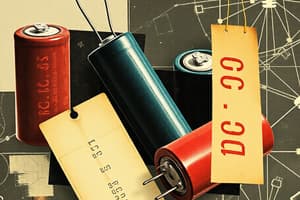Podcast
Questions and Answers
What is a capacitor?
What is a capacitor?
- A single conductor used to store electrical energy
- A system of two conductors separated by a conductor used to store electrical energy
- A system of two insulators used to store electrical energy
- A system of two conductors separated by an insulator used to store electrical energy (correct)
What is the charge of the capacitor?
What is the charge of the capacitor?
- The charge of the capacitor is directly proportional to the voltage
- The two conductors have charges Q and ʹQ, where Q is called the charge of the capacitor (correct)
- The charge of the capacitor depends on the size of the conductors
- The total charge on the capacitor is always positive
What is capacitance?
What is capacitance?
- The measure of voltage difference between the conductors of a capacitor
- The measure of total charge stored in a capacitor
- The ratio of charge to voltage for any electrical component
- The ratio Q/V for a capacitor is constant and is called the capacitance (c) of the capacitor (correct)
What is the SI unit of capacitance?
What is the SI unit of capacitance?
What does the electric field in the region between the conductors of a capacitor depend on?
What does the electric field in the region between the conductors of a capacitor depend on?
What is the SI unit of capacitance?
What is the SI unit of capacitance?
What does the capacitance of a capacitor depend on?
What does the capacitance of a capacitor depend on?
What happens to the capacitance when a charged conductor is kept near an uncharged conductor?
What happens to the capacitance when a charged conductor is kept near an uncharged conductor?
What is the total charge on a capacitor?
What is the total charge on a capacitor?
What is the electric field in the region between the conductors of a capacitor proportional to?
What is the electric field in the region between the conductors of a capacitor proportional to?
Flashcards are hidden until you start studying
Study Notes
Capacitor Overview
- A capacitor is a device that stores electrical energy in an electric field.
- It consists of two conductive plates separated by an insulating material known as a dielectric.
Charge of the Capacitor
- The charge stored in a capacitor is measured in coulombs and is related to the voltage across it and its capacitance.
Capacitance
- Capacitance is the ability of a capacitor to store charge per unit voltage.
- It is calculated using the formula: C = Q/V, where C is capacitance, Q is charge, and V is voltage.
SI Unit of Capacitance
- The SI unit of capacitance is the farad (F), defined as one coulomb per volt.
Electric Field Dependence
- The electric field between the conductors of a capacitor depends on the voltage applied and the separation distance between the plates.
Factors Affecting Capacitance
- Capacitance is influenced by the area of the conductive plates, the distance between them, and the properties of the dielectric material used.
Effect of Nearby Charged Conductors
- When a charged conductor is placed near an uncharged conductor, it induces a charge on the uncharged conductor, resulting in increased capacitance.
Total Charge on a Capacitor
- The total charge on a capacitor is the product of its capacitance and the voltage across it, represented as Q = CV.
Proportionality of Electric Field
- The electric field in the region between the conductors of a capacitor is directly proportional to the voltage across the capacitor and inversely proportional to the distance between the plates.
Studying That Suits You
Use AI to generate personalized quizzes and flashcards to suit your learning preferences.




